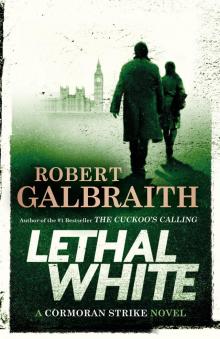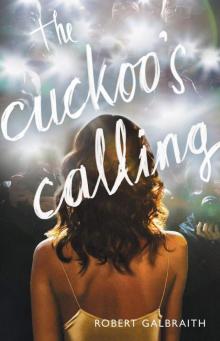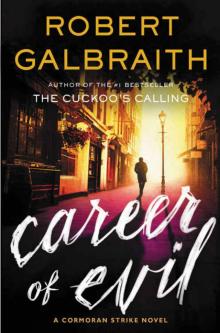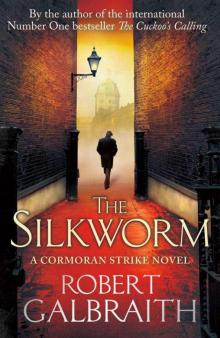- Home
- Robert Galbraith
Career of Evil Page 20
Career of Evil Read online
Page 20
Strike slid his phone back into his pocket, frowning. He hoped this news would focus Wardle’s mind on someone other than Malley.
“Get back in the car,” said Strike, lost in thought, and he set off towards Brockbank’s house again.
Robin returned to the driver’s seat of the Land Rover. The woman in the upper window was still staring.
Two policewomen in high-visibility tabards came walking down the street. Strike had reached the maroon door. The rap of metal on wood echoed down the street. Nobody answered. Strike was preparing to knock again when the policewomen reached him.
Robin sat up, wondering what on earth the police wanted with him. After a brief conversation all three of them turned and headed towards the Land Rover.
Robin pushed down the window, feeling suddenly and unaccountably guilty.
“They want to know,” Strike called, when within earshot, “whether I’m Mr. Michael Ellacott.”
“What?” said Robin, completely confused by the mention of her father’s name.
The ludicrous thought came to her that Matthew had sent the police after them—but why would he have told them that Strike was her father? And then the realization came to her, voiced as soon as understood.
“The car’s registered in Dad’s name,” she said. “Have I done something wrong?”
“Well, you’re parked on a double yellow line,” said one of the policewomen drily, “but that’s not why we’re here. You’ve been taking photographs of the facility. It’s all right,” she added, as Robin looked panicked. “People do it every day. You were caught on the security cameras. Can I see your driving license?”
“Oh,” said Robin weakly, aware of Strike’s quizzical look. “I only—I thought it would make an arty picture, you know? The barbed wire and the white building and—and the clouds…”
She handed over her documentation, studiously avoiding Strike’s eye, mortified.
“Mr. Ellacott’s your father, is he?”
“He lent us the car, that’s all,” said Robin, dreading the idea of the police contacting her parents and them finding out that she was in Barrow, without Matthew, ring-less and single…
“And where do you two live?”
“We don’t—not together,” said Robin.
They gave their names and addresses.
“You’re visiting someone, are you, Mr. Strike?” asked the second policewoman.
“Noel Brockbank,” said Strike promptly. “Old friend. Passing, thought I’d look him up.”
“Brockbank,” repeated the policewoman, handing Robin her license, and Robin hoped that the woman might know him, which would surely go a long way to repairing her gaffe. “Good Barrovian surname, that. All right, on you go. No more photos round here.”
“I’m. So. Sorry,” Robin mouthed at Strike as the policewomen walked away. He shook his head, grinning through his annoyance.
“‘Arty photo’… the wire… the sky…”
“What would you have said?” she demanded. “I could hardly tell them I was taking pictures of workmen because I thought one of them might be Brockbank—look—”
But when she brought up the picture of the workmen she realized that the tallest of them, with his ruddy cheeks, short neck and large ears, was not the man they sought.
The door of the nearest house opened. The gray-haired woman who had been watching from the upper window appeared, pulling a tartan shopping trolley. Her expression was now cheery. Robin was sure that the woman had observed the police arrive and depart, and was satisfied that they were not spies.
“It’s always ’appening,” she called loudly, her voice ringing across the street. She pronounced “always” “orlwuz.” The accent was unfamiliar to Robin, who had thought she knew Cumbrian, hailing from the next county. “They’ve gor cameraz orl awwer. Teeking registrations. We’re orl used to it.”
“Spot the Londoners,” said Strike pleasantly, which made her pause, curious.
“From London? Wha’ brings th’all the way to Barra?”
“Looking for an old friend. Noel Brockbank,” said Strike, pointing down the street, “but there’s no answer at his house. He’ll be at work, I expect.”
She frowned a little.
“Noel, did th’say? Not Holly?”
“We’d love to see Holly, if she’s around,” said Strike.
“She’ll be at work noo,” said the neighbor, checking her watch. “Bak’ry awwer in Vickerstown. Or,” said the woman, with a trace of grim humor, “tha can try the Crow’s Nest tonight. She’s usually there.”
“We’ll try the bakery—surprise her,” said Strike. “Where is it exactly?”
“Little white one, just up the road from Vengeance Street.”
They thanked her and she set off along the road, pleased to have been helpful.
“Did I hear that right?” Strike muttered, shaking open his map once they were safely back in the Land Rover. “‘Vengeance Street’?”
“That’s what it sounded like,” said Robin.
The short journey took them across a bridge spanning the estuary, where sailing boats bobbed on dirty-looking water or sat marooned on mudflats. Utilitarian, industrial buildings along the shore gave way to more streets of terraced houses, some pebble-dashed, some of red brick.
“Ships’ names,” guessed Strike as they drove up Amphitrite Street.
Vengeance Street ran up a hill. A few minutes’ exploration of its vicinities revealed a little white-painted bakery.
“That’s her,” said Strike at once, as Robin pulled in with a clear view of the glass door. “Got to be his sister, look at her.”
The bakery worker looked, thought Robin, harder than most men. She had the same long face and high forehead as Brockbank; her flinty eyes were outlined in thick kohl, her jet-black hair scraped back into a tight, unflattering ponytail. The cap-sleeved black T-shirt, worn under a white apron, revealed thick bare arms that were covered in tattoos from shoulder to wrist. Multiple gold hoops hung from each ear. A vertical frown line between her eyebrows gave her a look of perpetual bad temper.
The bakery was cramped and busy. Watching Holly bag up pasties, Strike remembered his venison pies from Melrose and his mouth watered.
“I could eat again.”
“You can’t talk to her in there,” said Robin. “We’d do better to approach her at home, or in the pub.”
“You could nip in and get me a pasty.”
“We had rolls less than an hour ago!”
“So? I’m not on a bloody diet.”
“Nor am I, anymore,” said Robin.
The brave words brought to mind the strapless wedding dress still waiting for her in Harrogate. Did she really not intend to fit into it? The flowers, the catering, the bridesmaids, the choice of first dance—would none of it be needed anymore? Deposits lost, presents returned, the faces of stunned friends and relatives when she told them…
The Land Rover was chilly and uncomfortable, she was very tired after hours of driving and for a few seconds—the time it took for a weak, treacherous lurch of her heart—the thought of Matthew and Sarah Shadlock made her want to cry all over again.
“D’you mind if I smoke?” said Strike, pushing down the window and letting in the cold air without waiting for an answer. Robin swallowed an affirmative answer; he had forgiven her for the police, after all. Somehow the chilly breeze helped brace her for what she needed to tell him.
“You can’t interview Holly.”
He turned to her, frowning.
“Taking Brockbank by surprise is one thing, but if Holly recognizes you she’ll warn him you’re after him. I’ll have to do it. I’ve thought of a way.”
“Yeah—that’s not going to happen,” said Strike flatly. “Odds are he’s either living with her or a couple of streets away. He’s a nutcase. If he smells a rat he’ll turn nasty. You’re not doing it alone.”
Robin drew her coat more tightly around her and said coolly:
“D’you want to
hear my idea or not?”
25
There’s a time for discussion and a time for a fight.
Blue Öyster Cult, “Madness to the Method”
Strike didn’t like it, but he was forced to concede that Robin’s plan was a good one and that the danger of Holly tipping off Noel outweighed the probable risk to Robin. Accordingly, when Holly left work with a colleague at five o’clock, she was followed on foot by Strike, although unaware of his presence. Robin, meanwhile, drove to a deserted stretch of road beside a wide stretch of marshy wasteland, retrieved her holdall from the back of the car, wriggled out of her jeans and dragged on a smarter, though creased, pair of trousers.
She was driving back across the bridge towards central Barrow when Strike called to inform her that Holly had not returned home, but headed straight to the pub at the end of her street.
“Great, I think that’ll be easier anyway,” shouted Robin in the direction of her mobile, which was lying on the front passenger seat, set to speakerphone. The Land Rover vibrated and rattled around her.
“What?”
“I said, I think—never mind, I’m nearly there!”
Strike was waiting outside the Crow’s Nest car park. He had just opened the passenger door when Robin gasped:
“Get down, get down!”
Holly had appeared in the doorway of the pub, pint in hand. She was taller than Robin and twice as broad in her black cap-sleeved T-shirt and jeans. Lighting a cigarette, she squinted around at what must have been a view she knew by heart, and her narrowed eyes rested briefly on the unfamiliar Land Rover.
Strike had scrambled into the front seat as best he could, keeping his head low. Robin put her foot down and drove away at once.
“She didn’t give me a second look when I was following her,” Strike pointed out, hoisting himself into a sitting position.
“You still shouldn’t let her see you if you can help it,” said Robin sententiously, “in case she noticed you and it reminds her.”
“Sorry, forgot you’re Highly Commended,” said Strike.
“Oh sod off,” said Robin with a flash of temper. Strike was surprised.
“I was joking.”
Robin turned into a parking space further up the street, out of sight of the Crow’s Nest entrance, then checked her handbag for a small package she had bought earlier in the afternoon.
“You wait here.”
“The hell I will. I’ll be in the car park, keeping an eye out for Brockbank. Give me the keys.”
She handed them over with ill grace and left. Strike watched her walking towards the pub, wondering about that sudden spurt of temper. Perhaps, he thought, Matthew belittled what he probably saw as meager achievements.
The Crow’s Nest stood where Ferry and Stanley Roads met and formed a hairpin bend: a large, drum-shaped building of red brick. Holly was still standing in the doorway, smoking and drinking her pint. Nerves fluttered in the pit of Robin’s stomach. She had volunteered for this: now hers was the sole responsibility for finding out where Brockbank was. Her stupidity at bringing the police down on them earlier had made her touchy, and Strike’s ill-timed humor had reminded her of Matthew’s subtly belittling comments about her countersurveillance training. After formal congratulations on her top marks Matthew had implied that what she had learned was, after all, no more than common sense.
Robin’s mobile rang in her coat pocket. Aware of Holly’s eyes on her as she approached, Robin pulled out the phone to check the caller’s name. It was her mother. On the basis that it would look slightly more unusual to switch off the call than to take it, she raised it to her ear.
“Robin?” came Linda’s voice as Robin passed Holly in the doorway without looking at her. “Are you in Barrow-in-Furness?”
“Yes,” said Robin. Confronted by two inner doors, she chose the one on the left, which brought her into a large, high-ceilinged and dingy bar room. Two men in the now-familiar blue overalls were playing pool at a table just inside the door. Robin sensed, rather than saw, the turning of several heads towards the stranger. Avoiding all eye contact, she drifted towards the bar as she continued her call.
“What are you doing there?” asked Linda and, without waiting for a response, “We’ve had the police on the phone, checking whether Dad lent you the car!”
“It was all a misunderstanding,” said Robin. “Mum, I can’t really talk now.”
The door opened behind her and Holly walked past, thickly tattooed arms folded, giving Robin a sideways look of appraisal and, she sensed, animosity. Apart from the short-haired barmaid, they were the only two females in the place.
“We called the flat,” her mother went on, unheeding, “and Matthew said you’d gone away with Cormoran.”
“Yes,” said Robin.
“And when I asked whether you’d have time to drop round for lunch this weekend—”
“Why would I be in Masham this weekend?” Robin asked, confused. Out of the corner of her eye she saw Holly taking a bar stool and chatting to several more blue-overalled men from the BAE factory.
“It’s Matthew’s dad’s birthday,” said her mother.
“Oh, of course it is,” said Robin. She had completely forgotten. There was to be a party. It had been on the calendar so long that she had got used to the sight of it and forgotten that the trip back to Masham was actually going to happen.
“Robin, is everything all right?”
“Like I said, Mum, I can’t really talk right now,” said Robin.
“Are you all right?”
“Yes!” said Robin impatiently. “I’m absolutely fine. I’ll ring you later.”
She hung up and turned to the bar. The barmaid, who was waiting to take her order, wore the same look of shrewd appraisal as the watching neighbor in Stanley Road. There was an extra layer to their caginess around here, but Robin understood, now, that theirs was not the chauvinistic antagonism of the local for the stranger. Rather, it was the protectiveness of a people whose business was confidential. With her heart beating slightly faster than usual, Robin said with an air of forced confidence:
“Hi, I don’t know whether you can help me. I’m looking for Holly Brockbank. I was told she might be in here.”
The barmaid considered Robin’s request, then said, unsmiling:
“Tha’s ’er, down the bar. Can A get th’somethin’?”
“Glass of white wine, please,” said Robin.
The woman whom she was impersonating would drink wine, Robin knew. She would also be unfazed by the edge of mistrust she saw in the barmaid’s eyes, by Holly’s reflexive antagonism, by the up-and-down stares of the pool players. The woman whom she was pretending to be was cool, clearheaded and ambitious.
Robin paid for her drink then headed directly for Holly and the three men chatting to her at the bar. Curious but cagey, they fell silent when it became clear that they were Robin’s destination.
“Hello,” said Robin, smiling. “Are you Holly Brockbank?”
“Yeah,” said Holly, her expression grim. “Whee’re thoo?”
“Sorry?”
Aware of several pairs of amused eyes on her, Robin kept her smile in place by sheer force of will.
“Who—are—yew?” asked Holly, in a mock London accent.
“My name’s Venetia Hall.”
“Ooh, unlucky,” said Holly with a broad grin at the closest workman, who sniggered.
Robin pulled a business card out of her handbag, freshly printed that afternoon on a machine in a shopping center, while Strike remained behind, keeping an eye on Holly in the bakery. It had been Strike’s suggestion that she use her middle name. (“Makes you sound like a poncy southerner.”)
Robin handed over the business card, looked boldly into Holly’s heavily kohled eyes and repeated: “Venetia Hall. I’m a lawyer.”
Holly’s grin evaporated. Scowling, she read the card, one of two hundred Robin had had printed for £4.50.
Hardacre and Hall
PERSONAL I
NJURY LAWYERS
Venetia Hall
Senior Partner
Tel: 0888 789654
Fax: 0888 465877 Email: venetia@h&hlegal.co.uk
“I’m looking for your brother Noel,” said Robin. “We—”
“’Ow did thoo know A was ’ere?”
In her mistrust she seemed to be swelling, bristling like a cat.
“A neighbor said you might be.”
Holly’s blue-overalled companions smirked.
“We might have some good news for your brother,” Robin plowed on bravely. “We’re trying to find him.”
“A dunno where ’e is and A don’ care.”
Two of the workmen slid away from the bar towards a table, leaving only one behind, who smiled faintly as he observed Robin’s discomfiture. Holly drained her pint, slid a fiver sideways at the remaining man and told him to get her another, clambered off her bar stool and strode away towards the Ladies, her arms held stiffly like a man’s.
“’Er boyo an’ ’er don’ speak,” said the barmaid, who had drifted up the bar to eavesdrop. She seemed to feel vaguely sorry for Robin.
“I don’t suppose you know where Noel is?” Robin asked, feeling desperate.
“’E’s not been in ’ere for a year or more,” said the barmaid vaguely. “You know where ’e is, Kev?”
Holly’s friend answered only with a shrug and ordered Holly’s pint. His accent revealed him to be Glaswegian.
“Well, it’s a pity,” said Robin, and her clear, cool voice did not betray the frantic pounding of her heart. She dreaded going back to Strike with nothing. “There could be a big payout for the family, if only I can find him.”
She turned to go.
“For the family, or for him?” asked the Glaswegian sharply.
“It depends,” said Robin coolly, turning back. She did not imagine that Venetia Hall would be particularly chummy with people unconnected to the case she was building. “If family members have had to take on a carer role—but I’d need details to judge. Some relatives,” lied Robin, “have had very significant compensation.”

 Lethal White
Lethal White The Cuckoo's Calling
The Cuckoo's Calling Career of Evil
Career of Evil The Silkworm
The Silkworm